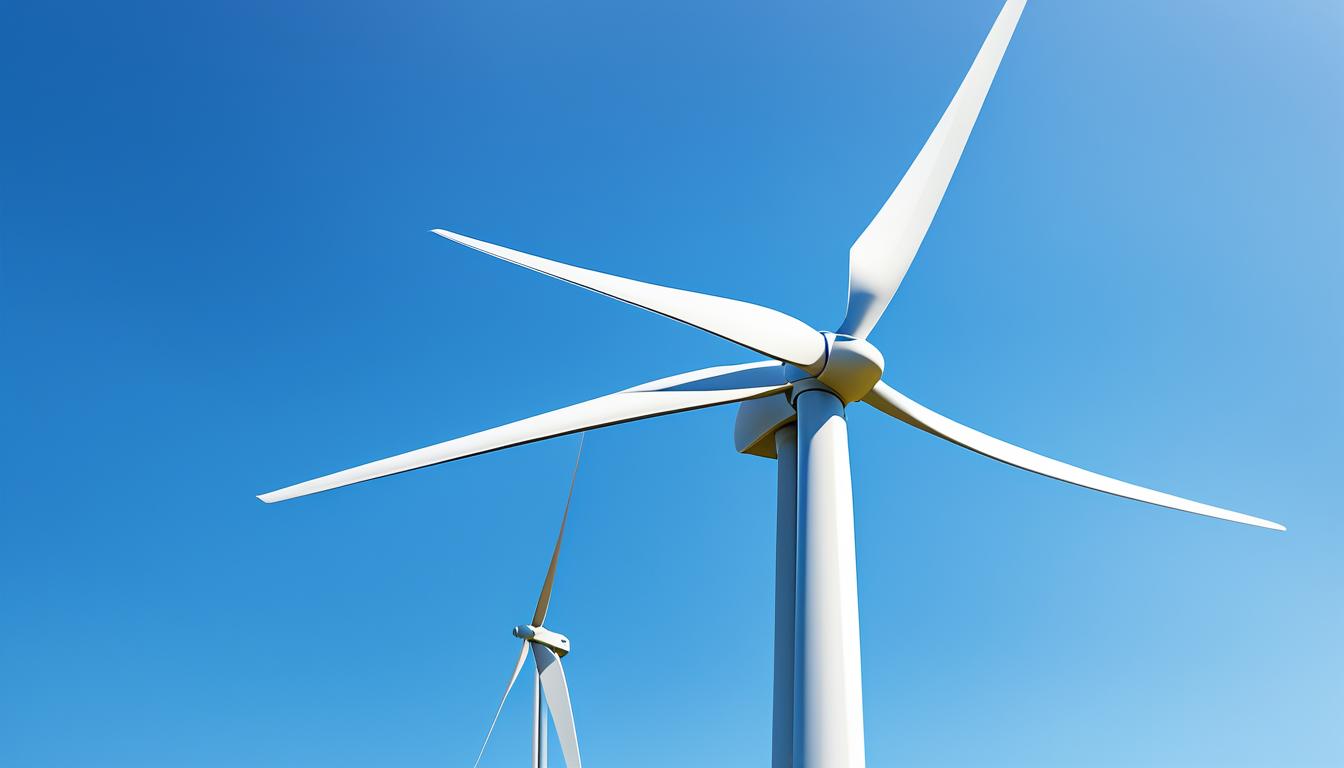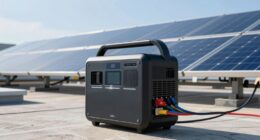You're looking to produce geothermal energy, but you're wondering what it'll cost you. Well, the initial investment can be substantial, with upfront costs around $2,500 per kW to build a power plant. However, operational costs are relatively low, ranging from $0.01 to $0.03 per kWh, making it competitive with other renewables. As you explore geothermal energy further, you'll find that high availability rates, low maintenance costs, and stable electricity prices make it a reliable choice. And, with costs decreasing over time, geothermal energy is becoming an increasingly attractive option – there's more to discover about its economic benefits and what makes it a viable choice for your energy needs.
Key Takeaways
- Initial investment in geothermal energy production can be substantial, but upfront costs are competitive with wind and solar power.
- Operational costs range from $0.01 to $0.03 per kWh, making geothermal electricity cost-effective and stable over time.
- Well drilling expenses can range from $5 million for a 2.5-mile well to $20 million for a 6.2-mile well, depending on site conditions.
- Geothermal power plants have low operational and maintenance costs, resulting in a levelized energy cost of around 4-7 cents per kWh.
- Technological advancements and economies of scale have driven down production costs over time, making geothermal energy more competitive.
Geothermal Energy Production Costs
When you consider the costs of producing geothermal energy, you'll find that the initial investment in drilling wells and building power plants can be substantial, but it pays off in the long run. The upfront costs of geothermal energy production can be high, but they're competitive with other renewable sources like wind and solar.
Once you've invested in drilling wells and building geothermal power plants, the ongoing operational and maintenance costs are relatively low. This makes geothermal energy a cost-effective long-term investment. Geothermal power plants can achieve high availability rates, running up to 98% of the time, which contributes to their economic viability.
As a result, the levelized cost of geothermal electricity remains stable over time, providing a reliable and consistent source of energy. With low maintenance costs and high power production, geothermal energy becomes an attractive option for electricity generation.
Economic Benefits of Geothermal Power

You'll find that geothermal power offers a convincing economic proposition, thanks to its remarkably low operational costs, which range from $0.01 to $0.03 per kWh. This makes geothermal electricity generation a competitive option in the renewable energy market.
Here are some key economic benefits of geothermal power:
- Stable Cost: The cost of geothermal electricity remains stable and doesn't fluctuate with fossil fuel supply, providing a reliable source of renewable power.
- Increased Capacity: Geothermal power capacity has been steadily increasing in the U.S. since the early 1970s, contributing to energy security.
- Low Initial Costs: Although the initial costs for geothermal plants are around $2,500 per kW, the long-term benefits and low operational costs make it a viable option.
- Diversified Applications: Geothermal technologies can be used not only for electricity generation but also for geothermal heating and cooling, providing a versatile solution for energy needs.
Site Development and Drilling Expenses

Now that you're exploring the cost of producing geothermal energy, you'll need to think about the expenses associated with site development and drilling.
You'll want to factor in well drilling expenses, which can range from $5 million for a 2.5-mile well to $20 million for a 6.2-mile well.
Additionally, you'll need to account for site exploration costs and pipeline construction fees to get a thorough picture of these expenses.
Well Drilling Expenses
Drilling a single well can cost anywhere from $5 million for a 2.5-mile well to $20 million for a 6.2-mile well, making site development and drilling expenses a significant upfront investment in geothermal energy production. As you contemplate investing in geothermal energy, it's crucial to grasp the costs involved in well drilling.
Here are some key factors to take into account:
- Confirming the geothermal resource: Proper well drilling is pivotal to confirm the viability of the geothermal resource before plant construction.
- Infrastructure investment: Investing in infrastructure like pipelines and wells is vital for efficient geothermal energy production.
- Drilling expenses: Drilling expenses can vary greatly depending on the depth and complexity of the well.
- Site development: Site development and drilling expenses are substantial initial costs in geothermal energy production.
Site Exploration Costs
As you progress with your geothermal energy project, site exploration expenses become a significant factor, including the costs associated with drilling exploratory wells to confirm the viability of the resource. These expenses can add up quickly, with a 2.5-mile well costing around $5 million and a 6.2-mile well costing approximately $20 million.
The initial site development costs for geothermal projects involve confirming the resource through well drilling. This is a vital step, as it determines whether the project is feasible or not. After analyzing the final resource, you can proceed with geothermal infrastructure construction, such as building pipelines and power plants.
The cost of scouting and developing geothermal sites is a substantial initial investment in geothermal energy production. However, it's crucial to get it right, as it establishes the foundation for the entire project. By understanding the site exploration expenses, you can better plan your geothermal energy project and ensure its success.
Pipeline Construction Fees
With your geothermal energy project moving forward, you'll need to factor in pipeline construction fees, a significant expense that involves laying infrastructure to transport geothermal fluids from the source to the power plant. This is an essential step in the development process, as it enables the efficient extraction and power generation of geothermal energy.
Here are some key aspects to keep in mind:
- Infrastructure costs: Pipeline construction fees are a major part of your initial investment in geothermal energy projects, contributing to the overall development expenses.
- Transporting geothermal fluids: The pipelines must be designed and built to transport geothermal fluids from the source to the power plant, which requires careful planning and execution.
- Efficient extraction: Proper pipeline construction is vital for efficient geothermal energy extraction and power generation.
- Long-term benefits: While the upfront costs may seem overwhelming, a well-constructed pipeline can provide long-term benefits and reduce operational costs in the long run.
Operational and Maintenance Expenses

You'll find that geothermal power plants boast remarkably low operational and maintenance costs, typically ranging from $0.01 to $0.03 per kilowatt-hour. This makes geothermal energy a sustainable and economically viable option for power generation.
| Cost Category | Description |
|---|---|
| Well Maintenance | Regular maintenance to ensure peak well performance |
| Water Pumps | Ongoing expenses for pumping water through the system |
| Well Redrilling | Occasional redrilling of wells to maintain efficiency |
As you can see, the operational costs are relatively low due to the high availability of geothermal systems, which can operate at 90% or more. This means that maintenance costs remain low, making geothermal power plants a capital-intensive but cost-effective option. Additionally, the stable and low operational and maintenance costs of geothermal energy make it a reliable choice for power generation. By understanding these costs, you can appreciate the benefits of geothermal energy and why it's becoming an increasingly popular choice for countries around the world.
Cost Reduction Strategies and Trends

Several factors have contributed to the decline in geothermal energy production costs, making it an even more attractive option for power generation. As you explore the geothermal energy sector, you'll notice that the cost reduction strategies and trends are driven by various innovations.
Here are some key factors that have led to a decrease in geothermal energy cost:
- Technological advancements: Improvements in drilling techniques and plant design have increased efficiency and reduced costs.
- Economies of scale: Larger-scale operations have led to lower costs per unit of energy produced.
- Improved resource assessment: Advanced exploration methods and resource assessment tools have helped identify more cost-effective geothermal sites.
- Market growth: Increased competition and growth in the geothermal energy sector have driven down production costs over time.
These trends have resulted in a significant cost reduction, making geothermal energy a more competitive option in the renewable energy market.
As you consider investing in geothermal energy, understanding the cost-reduction strategies and trends that are driving the industry forward is crucial. By doing so, you'll be better equipped to make informed decisions about your energy investments.
Levelized Energy Cost Analysis

As you explore the levelized energy cost analysis of geothermal energy, you'll notice that the costs remain stable over the project's lifetime, resulting in consistent electricity prices.
This stability is a significant advantage, especially when compared to fossil fuels, whose prices can fluctuate wildly.
You'll see how geothermal energy's unique cost structure contributes to its reliability and economic viability.
Geothermal Energy Costs
By analyzing the levelized energy cost of geothermal energy, it becomes clear that this renewable energy source offers a stable and predictable cost structure, unaffected by the volatility of fossil fuel prices. As you explore the costs associated with geothermal energy, you'll find that it's a reliable and cost-effective option for electricity production.
Here are some key takeaways about geothermal energy costs:
- Low cost per kWh: Geothermal electricity production costs range from $0.01 to $0.03 per kWh, making it a competitively priced renewable energy option.
- High availability: Geothermal power has high availability, running up to 98% of the time, ensuring a consistent and reliable source of electricity.
- Initial high upfront costs, low maintenance: While geothermal power plants require initial high upfront costs, they're offset by low maintenance costs, resulting in a reliable and cost-effective energy source.
- Growing geothermal energy capacity in the US: Geothermal electricity production has been steadily increasing in the United States since the early 1970s, showcasing its economic viability and growth potential.
Stable Electricity Prices
Since geothermal energy production costs remain stable over the project's lifetime, you can expect a predictable and consistent electricity price, unaffected by the volatility of fossil fuel markets. This stability is a significant advantage of geothermal energy, allowing you to budget for electricity costs with confidence.
According to the levelized energy cost analysis, the cost of geothermal electricity is around 4-7 cents per kWh, comparable to the average U.S. electricity price. High-temperature geothermal resources, in particular, offer a competitive edge, with costs as low as 3 cents per kWh. Additionally, tax credits and incentives can reduce the levelized energy cost, making geothermal energy an attractive option.
As the Future of Geothermal continues to unfold, you can expect increased investment and development in geothermal power, driven by growing demand for renewable energy sources. With its natural heat and reliable operation, geothermal electric capacity is poised to play a significant role in the shift to a sustainable energy mix.
Frequently Asked Questions
Is It Expensive to Produce Geothermal Energy?
You're wondering if producing geothermal energy breaks the bank? Not necessarily! While initial investments can be steep, the cost per kilowatt-hour is relatively low, making it a competitive option for your long-term energy plans.
What Is the Running Cost of Geothermal Energy?
Imagine a penny spinning, symbolizing the low cost of geothermal energy. You'll be surprised to know that the running cost of geothermal energy ranges from $0.01 to $0.03 per kWh, making it a super affordable option.
How Much Does It Cost to Build a Geothermal System?
You're wondering how much it costs to build a geothermal system. Well, the typical cost ranges from $2,500 to $5,000 per kilowatt, depending on the type, location, and size of the system you're building.
How Much Does It Cost to Drill for Geothermal Energy?
You're wondering how much it costs to drill for geothermal energy – well, a 2.5-mile well runs around $5 million, while a 6.2-mile well can cost up to $20 million, depending on the project's scope.
Conclusion
As you consider investing in geothermal energy, you're likely wondering if the benefits outweigh the costs. The good news is that while upfront expenses can be steep, the long-term savings and environmental advantages make it a worthwhile investment.
So, will the cost of producing geothermal energy continue to decline as technology advances? Only time will tell, but one thing is certain – the future of renewable energy is looking bright.









